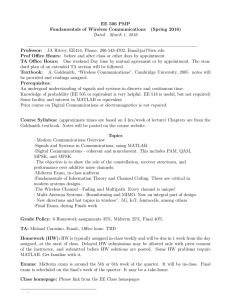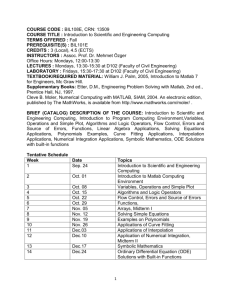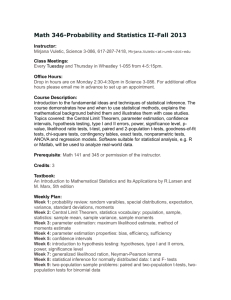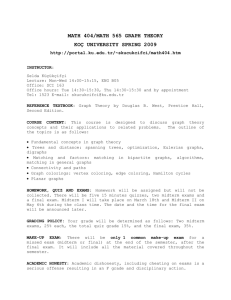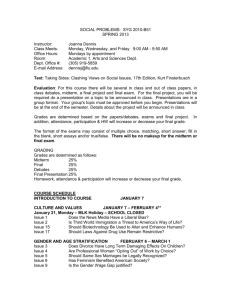Course Policy
advertisement
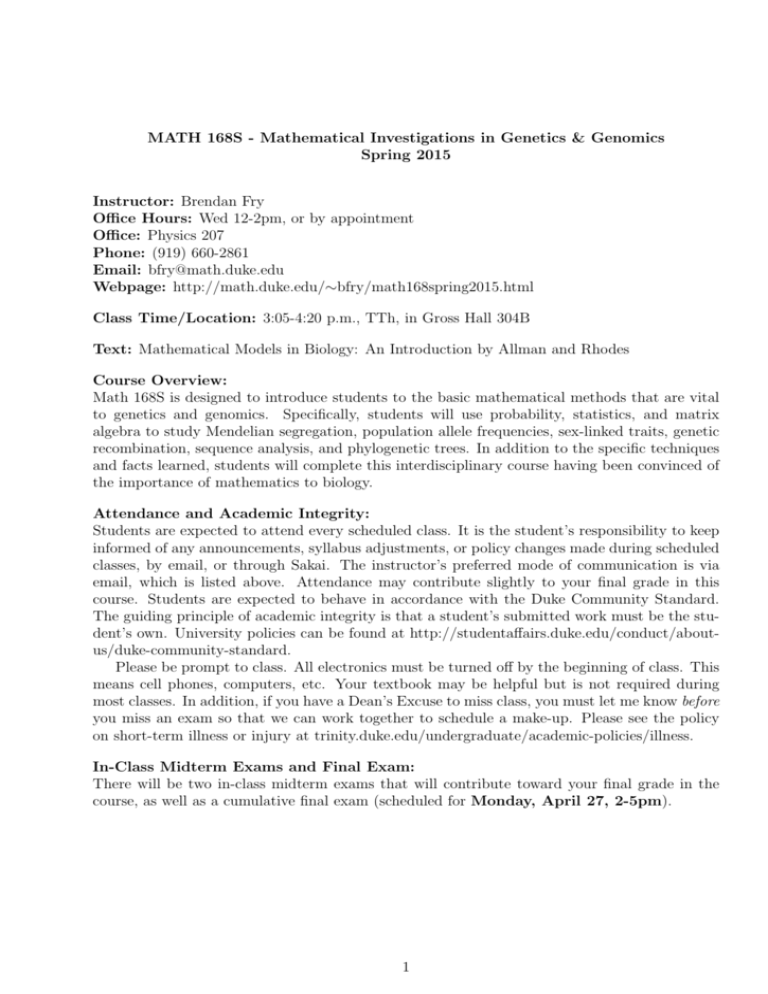
MATH 168S - Mathematical Investigations in Genetics & Genomics Spring 2015 Instructor: Brendan Fry Office Hours: Wed 12-2pm, or by appointment Office: Physics 207 Phone: (919) 660-2861 Email: bfry@math.duke.edu Webpage: http://math.duke.edu/∼bfry/math168spring2015.html Class Time/Location: 3:05-4:20 p.m., TTh, in Gross Hall 304B Text: Mathematical Models in Biology: An Introduction by Allman and Rhodes Course Overview: Math 168S is designed to introduce students to the basic mathematical methods that are vital to genetics and genomics. Specifically, students will use probability, statistics, and matrix algebra to study Mendelian segregation, population allele frequencies, sex-linked traits, genetic recombination, sequence analysis, and phylogenetic trees. In addition to the specific techniques and facts learned, students will complete this interdisciplinary course having been convinced of the importance of mathematics to biology. Attendance and Academic Integrity: Students are expected to attend every scheduled class. It is the student’s responsibility to keep informed of any announcements, syllabus adjustments, or policy changes made during scheduled classes, by email, or through Sakai. The instructor’s preferred mode of communication is via email, which is listed above. Attendance may contribute slightly to your final grade in this course. Students are expected to behave in accordance with the Duke Community Standard. The guiding principle of academic integrity is that a student’s submitted work must be the student’s own. University policies can be found at http://studentaffairs.duke.edu/conduct/aboutus/duke-community-standard. Please be prompt to class. All electronics must be turned off by the beginning of class. This means cell phones, computers, etc. Your textbook may be helpful but is not required during most classes. In addition, if you have a Dean’s Excuse to miss class, you must let me know before you miss an exam so that we can work together to schedule a make-up. Please see the policy on short-term illness or injury at trinity.duke.edu/undergraduate/academic-policies/illness. In-Class Midterm Exams and Final Exam: There will be two in-class midterm exams that will contribute toward your final grade in the course, as well as a cumulative final exam (scheduled for Monday, April 27, 2-5pm). 1 Homework: Homework is an essential part of this course. Math should be learned through practice, and so one of your best tools for learning the material is through homework. Hand-written homework will be submitted, and will be assigned about once per week. Please return your homework by the due date at the beginning of class in clear writing using complete sentences where appropriate. Late homework will not be accepted. Homework should be written neatly and show all work, and multiple papers should be stapled. When calculating final grades, the lowest homework score will be dropped. You are encouraged to work in groups to exchange general ideas and help each other understand how to approach problems, but each student’s work must be his or her own. Ultimately, you should attempt to complete the homework without assistance, as this will help in preparing you for the exams. You are also encouraged to ask questions during office hours. Participation: To ensure active engagement, students will give presentations throughout the semester. Students will prepare and give short lectures on assigned readings from textbooks and research articles. These mini-lectures by students will be given on topics directly from the syllabus and on motivating examples chose to ignite interest. By lecturing to your peers, you will more deeply understand the ideas of the seminar and develop your expository skills. Each student will receive a participation grade reflecting their completion of these mini-lectures, overall course engagement, and attendance. Research Project: In order to further immerse students in the field, students will complete a research project. The project will include both a written report and a presentation to the class during the final two weeks of the semester. MATLAB: MATLAB is an easy to use software program that you can use to perform experiments in silico and to analyze data sets. MATLAB is a tool that will allow us to gain deeper insights into the biological questions we’re studying. No prior knowledge of MATLAB is assumed, and I will provide ample support for using the software. Grade breakdown: Homework Participation Midterm 1 Midterm 2 Research Project Final Exam 2 15% 10% 15% 15% 20% 25%
